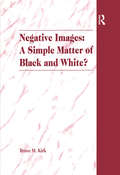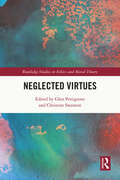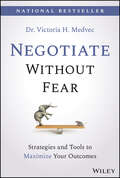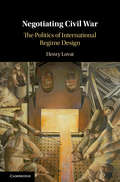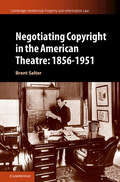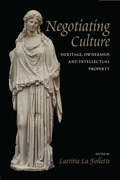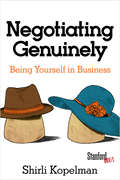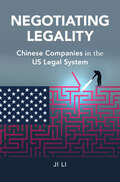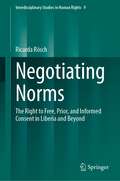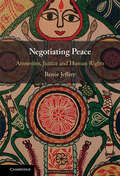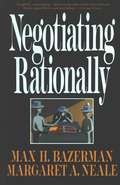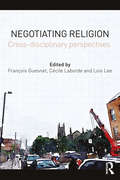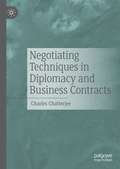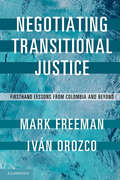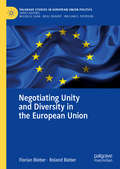- Table View
- List View
Negative Ethnicity: From Bias to Genocide
by Koigi Wa Wamwere"Negative ethnicity" is Koigi wa Wamwere's name for the deep-seated tensions in Africa that the world has seen flare so terrifyingly. The genocide in Rwanda and "ethnic" killing in the Democratic Republic of Congo, Nigeria, and elsewhere stand out as examples. Wa Wamwere argues that these clashes cannot properly be described as ethnically motivated; ethnicity, a positive distinction, has nothing of the hatred here at work. Negative Ethnicity gives a new picture of the force behind untold deaths on the continent, dispelling the myth of an intractable conflict waged along simple, ancient lines.Negative Ethnicity explains the roots, colonial and pre-colonial, of the current "ethnic" tensions. It goes on to describe how, for most Africans, ethnic identity is ambiguous, and analyzes why that fact is obscured. The culprits are many: chronic poverty, a broken education system, preying dictators, corrupt officials, the colonial legacy of hate, the ongoing exploitation of the West.Negative Ethnicity is both a history and a manual for change, intended to introduce Westerners to the crisis and to give Africans a new understanding of it. Perhaps never before has the problem been addressed with such clarity and insight.
Negative Images: An Examination of 'Race' and the Juvenile Justice System
by Bruce M. KirkThat black young people have been subject to unequal treatment in the youth justice system has been the belief of some individuals and groups, reinforced, at best, by anecdotal evidence. Negative Images: A Simple Matter of Black and White? provides not only evidential weight to uphold this view but also provides some insights into the processes by which it comes about. Findings of a case study detailed in the book demonstrate how in one youth court black youths were over-represented amongst those receiving high-tariff sentencing and that this over-representation could not be explained by seriousness or persistence of offending. Whilst responsibility for differential sentencing has often been laid at the door of Magistrates, this study reveals how social work court report practice may be contributing to the situation.
Neglected Policies: Constitutional Law and Legal Commentary as Civic Education
by Ira L. StrauberIn Neglected Policies, Ira L. Strauber challenges scholars and critics of constitutional jurisprudence to think differently about the Constitution and its interpretation. He argues that important aspects of law, policies, and politics are neglected because legal formalisms, philosophical theories, the reasoning of litigators and judges, and even the role of the courts are too often taken for granted. Strauber advocates an alternative approach to thinking about the legal and moral abstractions ordinarily used in constitutional decision making. His approach, which he calls "agnostic skepticism," interrogates all received jurisprudential notions, abandoning the search for "right answers" to legal questions. It demands that attention be paid to the context-specific, circumstantial social facts relevant to given controversies and requires a habit of mind at home with relativism. Strauber situates agnostic skepticism within contemporary legal thought, explaining how it draws upon sociological jurisprudence, legal realism, and critical legal studies. Through studies of cases involving pornography, adoption custody battles, flag burning, federalism, and environmental politics, he demonstrates how agnostic skepticism applies to constitutional issues. Strauber contends that training in skeptical critique will enable a new kind of civic education and culture--one in which citizens are increasingly tolerant of the ambiguities and contradictions inherent in the law and politics of a pluralistic society. Using insights from the social sciences to examine the ways constitutional cases are studied and taught, Neglected Policies will interest scholars of jurisprudence, political science, and the sociology of law.
Neglected Virtues (Routledge Studies in Ethics and Moral Theory)
by Christine Swanton Glen PettigroveMuch of the work that has been done on virtue has been devoted to getting virtue ethics a seat at the theoretical table. It has been concerned with showing that virtue ethics can provide a satisfactory account of right action to rival accounts offered by consequentialism and deontology. This volume of essays explores the nitty-gritty details of particular virtues. It includes original contributions from a number of leading scholars in virtue ethics. Most of the virtues discussed – such as ambition, cheerfulness, creativity, magnificence, pride, wit, and wonder – have been almost wholly neglected by contemporary ethicists. The volume also includes coverage of other virtues that have received a fair amount of attention in recent years, such as charity, hope, justice, practical wisdom, and temperance. Here the essays address largely ignored dimensions of these virtues and show how these discussions can enrich our understanding of neglected virtues. Neglected Virtues is a welcome addition to the scholarly literature on virtue ethics. Its focus on individual virtues, while not meant to be exhaustive, will open new avenues for future research in this rapidly growing area of ethics and moral philosophy.
Negotiate Without Fear: Strategies and Tools to Maximize Your Outcomes
by Victoria MedvecThe tools you need to maximize success in any negotiation, at any level With Negotiate Without Fear: Strategies and Tools to Maximize Your Outcomes, master negotiator, Kellogg professor, and accomplished CEO Victoria Medvec delivers an authoritative and practical resource for eliminating the fear that impedes success in negotiation. In this book, readers will discover unique and proprietary negotiation strategies honed over decades advising Fortune 500 clients on high-stakes, complex negotiations. Negotiate Without Fear provides readers at all levels of negotiation skill the ability to increase their negotiating confidence and maximize their negotiation success. You'll learn how to: Put the right issues on the table by defining your objectives for the negotiation Analyze the issues being negotiated with an Issue Matrix to ensure you have the right issues to secure what you want Establish ambitious goals using a proprietary tool to identify the weaknesses in the other side's best outside alternative (BATNA) Leverage a unique architecture for creating and delivering Multiple Equivalent Simultaneous Offers (MESOs) Negotiate Without Fear belongs on the bookshelves of executives and all the dealmakers who work for them. Additionally, specific advice is provided in every chapter for individuals who are negotiating for themselves and in the everyday world. This book is an invaluable guide for anyone who hopes to sharpen their negotiating skills and achieve success in any arena.
Negotiated Justice and Corporate Crime: The Legitimacy Of Civil Recovery Orders And Deferred Prosecution Agreements (Crime Prevention and Security Management)
by Colin King Nicholas LordThis book argues that there is a strong normative argument for using the criminal law as a primary response to corporate crime. In practice, however, corporate crimes are rarely dealt with through criminal sanctioning mechanisms. Rather, the preference – for both prosecutors and corporates – appears to be on negotiating out of the criminal process. Reflecting this emphasis on negotiation, this book examines the use of Civil Recovery Orders and Deferred Prosecution Agreements as responses to corporate crime, and discusses a variety of UK case studies. Drawing upon legal and criminological backgrounds, and with an emphasis on the conceptual frameworks of ‘negotiated justice’ and ‘legitimacy’, the authors examine the law, policy and practice of these enforcement responses. They offer an original, theoretically-informed analysis which is accessible to practitioners and researchers.
Negotiating Change: Overcoming Entrenched Harmful Behaviours and Beliefs
by Mike LotzofBehaviour change programs fail more often than they succeed. Failure is avoidable, but not if we keep attempting change the same way. Negotiating Change is the culmination of decades of work with global corporations in ethics, communications, behaviour change and regulatory and social compliance. The book provides a text for corporate leaders, their advisors and academics and students from several disciplines to explain why the current approach to behaviour change and compliance fails, and documents why the author’s approach has been successful in more than 60 countries. The book synthesises research insights from evolutionary psychology, behavioural sciences, neuroscience and neurochemistry into a practical guide. It explains why systems for behavioural guidance and control based on beliefs, religions, ethics, cultures and the law are ineffective in our globalised, hyper-connected, multi-cultural world. The author proposes that harm, first introduced by Hippocrates to guide the practice of medicine, provides a more useful linguistic model to engage. Harm and the Harm Principles provide an objective, independent and universal measure for assessing behaviour, applying equally regardless of race, religion, gender, age or status. Harm is culturally neutral and operates independently of laws, philosophies or codes of conduct. Harm transcends geography and time. Corporations are particularly vulnerable as they operate not just across jurisdictions and cultures, but their behaviour is influenced by the very nature of incorporation, corporate structure and stock-market pressure. Negotiating Change contains tools for boards and senior executives who want to build a more trustworthy organisation. It will not stop bad people doing bad things, but at least the self-righteous mask of legality will be removed.
Negotiating Childhoods: Applying A Moral Filter To Children S Everyday Lives (Studies In Childhood And Youth Series)
by Sam FrankelThis book investigates how constructed representations of the child have and continue to restrict children's opportunities to engage in moral discourses, and the implications this has on children's everyday experiences. By considering a moral dimension to both structure and agency, the author focuses on the nature of the images that are used to represent the child and how these sit in contrast to the active and meaning-driven way in which children negotiate their everyday lives. The book therefore argues that 'morality' provides a filter to understand the backdrop for interaction, as well as offering a focus for engaging with the individual as a social agent, acting and reacting in the world around them. Negotiating Childhoods will be of interest to students and scholars of sociology, childhood studies, criminology, social work, culture and media studies and philosophy.
Negotiating Civil War: The Politics of International Regime Design
by Henry LovatCivil war has been a fact of political life throughout recorded history. However, unlike inter-state wars, international law has not traditionally regulated such conflicts. How then can we explain the post-1945 emergence and evolution of international treaty rules regulating the conduct of internal armed conflict: the 'Civil War Regime'? Negotiating Civil War combines insights derived from Realist, Rationalist, Liberal, and Constructivist approaches to International Relations to answer this question, revisiting the negotiation of the 1949 Geneva Conventions, the 1977 Additional Protocols, and the 1998 Rome Statute of the International Criminal Court. This study provides a rigorous, critical account of the making of the Civil War Regime. Sophisticated and persuasive, it illustrates the complex interplay of material, ideational, social, and strategic factors in shaping these rules with important lessons for the making and unmaking of international law in a rapidly shifting international political, economic, and security environment.
Negotiating Copyright in the American Theatre: 1856–1951 (Cambridge Intellectual Property and Information Law #58)
by Brent S. SalterDrawing on fascinating archival discoveries from the past two centuries, Brent Salter shows how copyright has been negotiated in the American theatre. Who controls the space between authors and audiences? Does copyright law actually protect playwrights and help them make a living? At the center of these negotiations are mediating businesses with extraordinary power that rapidly evolved from the mid-nineteenth to mid-twentieth centuries: agents, publishers, producers, labor associations, administrators, accountants, lawyers, government bureaucrats, and film studio executives. As these mediators asserted authority over creativity, creators organized to respond, through collective minimum contracts, informal guild expectations, and professional norms, to protect their presumed rights as authors. This institutional, relational, legal, and business history of the entertainment history in America illuminates both the historical context and the present law. An innovative new kind of intellectual property history, the book maps the relations between the different players from the ground up.
Negotiating Culture: Heritage, Ownership, and Intellectual Property
by Laetitia La FolletteRival claims of ownership or control over various aspects of culture are a regular feature of our twenty-first-century world. Such debates are shaping disciplines as diverse as anthropology and archaeology, art history and museum studies, linguistics and genetics. This provocative collection of essays--a series of case studies in cultural ownership by scholars from a range of fields--explores issues of cultural heritage and intellectual property in a variety of contexts, from contests over tangible artifacts as well as more abstract forms of culture such as language and oral traditions to current studies of DNA and genes that combine nature and culture, and even new, nonproprietary models for the sharing of digital technologies. Each chapter sets the debate in its historical and disciplinary context and suggests how the approaches to these issues are changing or should change. One of the most innovative aspects of the volume is the way each author recognizes the social dimensions of group ownership and demonstrates the need for negotiation and new models. The collection as a whole thus challenges the reader to reevaluate traditional ways of thinking about cultural ownership and to examine the broader social contexts within which negotiation over the ownership of culture is taking place. In addition to Laetitia La Follette, contributors include David Bollier, Stephen Clingman, Susan DiGiacomo, Oriol Pi-Sunyer, Margaret Speas, Banu Subramaniam, Joe Watkins, and H. Martin Wobst.
Negotiating Genocide in Rwanda
by Erin JesseeThis book is an oral history-based study of the politics of history in the aftermath of the 1994 genocide in Rwanda. Using life history and thematic interviews, the author brings the narratives of officials, survivors, returnees, perpetrators, and others whose lives have been intimately affected by genocide into conversation with scholarly studies of the Rwandan genocide, and Rwandan history more generally. In doing so, she explores the following questions: How do Rwandans use history to make sense of their experiences of genocide and related mass atrocities? And to what end? In the aftermath of such violence, how do people's interpretations of the varied forms of suffering they endured then influence their ability to envision and support a peaceful future for their nation that includes multi-ethnic cooperation?
Negotiating Genuinely: Being Yourself in Business
by Shirli KopelmanWe often assume that strategic negotiation requires us to wall off vulnerable parts of ourselves and act rationally to win. But, what if you could just be you in business? Taking a positive approach, this brief distills years of research, teaching, and coaching into an integrated framework for negotiating genuinely. One of the most fundamental and challenging battlegrounds in our work lives, negotiation calls on us to compete and cooperate to do our jobs well and achieve extraordinary results. But, the biggest challenge in a negotiation is to be strategic while also being real. Author Shirli Kopelman argues that this duality is both possible and powerful. In Negotiating Genuinely, she teaches readers how to reconcile the disparate hats that they wear in everyday life—with families, friends, and colleagues—bringing one "integral hat" to the negotiation table. Kopelman develops and shares techniques that illuminate this approach; exercises along the way help readers to negotiate more naturally, positively, and successfully.
Negotiating Justice: Progressive Lawyering, Low-Income Clients, and the Quest for Social Change
by Corey S. ShdaimahWhile many young people become lawyers for the big bucks, others are motivated by the pursuit of social justice, seeking to help people for whom legal services are financially, socially, or politically inaccessible. These progressive lawyers often bring a considerable degree of idealism to their work, and many leave the field due to insurmountable red tape and spiraling disillusionment. But what about those who stay? And what do their clients think? Negotiating Justice explores how progressive lawyers and their clients negotiate the dissonance between personal idealism and the realities of a system that doesn’t often champion the rights of the poor.Corey S. Shdaimah draws on over fifty interviews with urban legal service lawyers and their clients to provide readers with a compelling behind-the-scenes look at how different notions of practice can present significant barriers for both clients and lawyers working with limited resources, often within a legal system that many view as fundamentally unequal or hostile. Through consideration of the central themes of progressive lawyering—autonomy, collaboration, transformation, and social change—Shdaimah presents a subtle and complex tableau of the concessions both lawyers and clients often have to make as they navigate the murky and resistant terrains of the legal system and their wider pursuits of justice and power.
Negotiating Legality: Chinese Companies in the US Legal System (Cambridge Studies in Law and Society)
by Ji LiDespite escalating geopolitical rivalry, the US and China continue to be economically intertwined. Numerous Chinese companies have made substantial investments in the US and are reluctant exit this strategically important market. While the global expansion of Chinese companies has ignited intense policy and academic debates, their interactions with complex host-state legal systems have largely escaped systematic examination. To fill this knowledge gap, Negotiating Legality introduces a dual institutional framework and applies it to analyzing extensive interviews and multi-year survey data, thereby shedding light on how Chinese companies develop in-house legal capacities, engage with US legal professionals, and navigate litigation in US courts. As the first comprehensive investigation of these crucial topics, this book is indispensable for anyone interested in China's rise, its global impacts-especially on legal systems of developed nations like the US-and the intricate dynamics of US-China relations.
Negotiating Norms: The Right to Free, Prior, and Informed Consent in Liberia and Beyond (Interdisciplinary Studies in Human Rights #9)
by Ricarda RöschThe book explores the right to free, prior and informed consent (FPIC) – a highly controversial right. It is mainly discussed in the context of large-scale business projects on Indigenous territories but also with respect to the creation of protected areas and communities’ traditional resource rights. From a legal anthropological perspective, it attempts to disentangle the various coexisting understandings of FPIC and provide an explanation for the multiplicity of FPIC norms or – to put it in other words – its fragmentation. It examines the right- or stakeholders of FPIC, the scope of the consent requirement, the respect for self-determined decision-making, and the right to FPIC of women in different sociolegal fields. Moreover, it explores the impact of power relations, strategic alliances, and discourses within these fields and shows that the emerging FPIC norms are the result of norm negotiation processes. The fields that are examined include transnational law – more specifically, human rights, environmental, and development law -, the Liberian post-conflict forest and land legislation, and Liberian community forests as fields in which FPIC is operationalized. Liberia is quite unique in this respect. It is not only one of the few countries in Africa recognizing FPIC but has also begun implementing it. The book shows that based on the logic of a sociolegal field, legal identities are discursively created and determine the meaning of FPIC. Moreover, different actors can resort to different legalities shaping the emerging FPIC norm.
Negotiating Peace: Amnesties, Justice and Human Rights
by Renée JefferyIn the past two decades, peace negotiators around the world have increasingly accepted that granting amnesties for human rights violations is no longer an acceptable bargaining tool or incentive, even when the signing of a peace agreement is at stake. While many states that previously saw sweeping amnesties as integral to their peace processes now avoid amnesties for human rights violations, this anti-amnesty turn has been conspicuously absent in Asia. In Negotiating Peace: Amnesties, Justice and Human Rights Renée Jeffery examines why peace negotiators in Asia have resisted global anti-impunity measures more fervently and successfully than their counterparts around the world. Drawing on a new global dataset of 146 peace agreements (1980–2015) and with in-depth analysis of four key cases - Timor-Leste, Aceh Indonesia, Nepal and the Philippines - Jeffery uncovers the legal, political, economic and cultural reasons for the persistent popularity of amnesties in Asian peace processes.
Negotiating Pharmaceutical Uncertainty: Women's Agency in a South African HIV Prevention Trial
by Eirik Saethre Jonathan StadlerTelling the story of a clinical trial testing an innovative gel designed to prevent women from contracting HIV, Negotiating Pharmaceutical Uncertainty provides new insight into the complex and contradictory relationship between medical researchers and their subjects. Although clinical trials attempt to control and monitor participants' bodies, Saethre and Stadler argue that the inherent uncertainty of medical testing can create unanticipated opportunities for women to exercise control over their health, sexuality, and social relationships. Combining a critical analysis of the social production of biomedical knowledge and technologies with a detailed ethnography of the lives of female South African trial participants, this book brings to light issues of economic exclusion, racial disparity, and spiritual insecurity in Johannesburg's townships. Built on a series of tales ranging from strategy sessions at the National Institutes of Health to witchcraft accusations against the trial, Negotiating Pharmaceutical Uncertainty illuminates the everyday social lives of clinical trials.As embedded anthropologists, Saethre and Stadler provide a unique and nuanced perspective of the reality of a clinical trial that is often hidden from view.
Negotiating Pharmaceutical Uncertainty: Women's Agency in a South African HIV Prevention Trial
by Eirik Saethre Jonathan StadlerTelling the story of a clinical trial testing an innovative gel designed to prevent women from contracting HIV, Negotiating Pharmaceutical Uncertainty provides new insight into the complex and contradictory relationship between medical researchers and their subjects. Although clinical trials attempt to control and monitor participants' bodies, Saethre and Stadler argue that the inherent uncertainty of medical testing can create unanticipated opportunities for women to exercise control over their health, sexuality, and social relationships. Combining a critical analysis of the social production of biomedical knowledge and technologies with a detailed ethnography of the lives of female South African trial participants, this book brings to light issues of economic exclusion, racial disparity, and spiritual insecurity in Johannesburg's townships. Built on a series of tales ranging from strategy sessions at the National Institutes of Health to witchcraft accusations against the trial, Negotiating Pharmaceutical Uncertainty illuminates the everyday social lives of clinical trials. As embedded anthropologists, Saethre and Stadler provide a unique and nuanced perspective of the reality of a clinical trial that is often hidden from view.
Negotiating Rationally
by Max H. BazermanDraws on a study of the irrational behavior of ten thousand executives and student leaders to help managers and negotiators check their personal biases and assumptions in order to reach the best agreements possible.
Negotiating Religion: Cross-disciplinary perspectives
by Cécile Laborde François Guesnet Lois LeeNegotiating religious diversity, as well as negotiating different forms and degrees of commitment to religious belief and identity, constitutes a major challenge for all societies. Recent developments such as the ‘de-secularisation’ of the world, the transformation and globalisation of religion and the attacks of September 11 have made religious claims and religious actors much more visible in the public sphere. This volume provides multiple perspectives on the processes through which religious communities create or defend their place in a given society, both in history and in our world today. Offering a critical, cross-disciplinary investigation into processes of negotiating religion and religious diversity, the contributors present new insights on the meaning and substance of negotiation itself. This volume draws on diverse historical, sociological, geographic, legal and political theoretical approaches to take a close look at the religious and political agents involved in such processes as well as the political, social and cultural context in which they take place. Its focus on the European experiences that have shaped not only the history of ‘negotiating religion’ in this region but also around the world, provides new perspectives for critical inquiries into the way in which contemporary societies engage with religion. This study will be of interest to academics, lawyers and scholars in law and religion, sociology, politics and religious history.
Negotiating State and Non-State Law: The Challenge of Global and Local Legal Pluralism (f ASIL Studies in International Legal Theory)
by Michael HelfandTrends in legal philosophy, international law, transnational law, law and religion, and political science all point toward the increasing role played by non-state law in both public and private ordering. Numerous organizations, institutions, associations, and groups have emerged alongside the nation-state, each purporting to provide their members with rules and norms to govern their conduct and organize their affairs. The nation-state increasingly finds itself sandwiched, so to speak, between two broad and contrasting categories of non-state law. The first category – law above the state – captures a wide range of legal systems that function across the territorial borders of nation-states. The second category – law below the state – includes various forms of local customary, religious, and indigenous law. Indeed, as these forms of non-state law persist and proliferate alongside the nation-state, the relationship between state and non-state law becomes more complex, multifaceted, and tense. This volume addresses this relationship between the nation-state and these various forms of non-state law, considering whether and to what extent state and non-state law can coexist and how each form of law seeks to influence as well as transform the other. Examines the relationship between state and non-state law, the extent to which they conflict, and to what extent can they work together Presents an in-depth exploration about the dynamics between the state and international/transnational law Shows how the dynamic between state and non-state law works between the state and religious/indigenous law
Negotiating Techniques in Diplomacy and Business Contracts
by Charles ChatterjeeDiplomacy is an established discipline, but it is still wearing its old garments,failing to display its capacity to deal with new unique bi-lateral and international disputes. In conformity with the provisions of Article 33 of the UN Charter, thisbook emphasises the need for current-day diplomats to have appropriate training in negotiation and conciliation techniques rather than leaving inter-state or international dispute hearings unsettled with their inevitable consequences.The book also identifies the role and effectiveness of negotiating techniques in conducting business contracts, women’s role in negotiating diplomatic and business deals, negotiating techniques in import-export trade, project finance, and syndicated loan agreements. It further discusses the UN system and diplomacy.The opinions expressed in this book are those of the author, and in no way may be attributed to the institution to which he belongs.
Negotiating Transitional Justice: Firsthand Lessons from Colombia and Beyond
by Mark Freeman Iván OrozcoThe recent Colombian peace negotiations took the art and science of negotiating transitional justice to unprecedented levels of complexity. For decades, the Colombian government fought a bitter war against FARC guerrilla forces. After protracted negotiations, the two parties reached a peace deal that took account of the rights of victims. As first-hand participants in the talks, and principal advisers to the Colombia government, Mark Freeman and Iván Orozco offer a unique account of the mechanics through which accountability issues were addressed. Their many years working as scholars of war and transnational justice are brought to bear on their analysis of the decision to ensure transitional justice as part of the final deal. Drawing from this case study and other global experiences, Freeman and Orozco offer a comprehensive theoretical and practical conception of what makes the 'devil's dilemma' of negotiating peace with justice implausible but feasible.
Negotiating Unity and Diversity in the European Union (Palgrave Studies in European Union Politics)
by Florian Bieber Roland BieberThis book explores how the European Union has been responding to the challenge of diversity. In doing so, it considers the EU as a complex polity that has found novel ways for accommodating diversity. Much of the literature on the EU seeks to identify it as a unique case of cooperation between states that moves past classic international cooperation. This volume argues that in order to understand the EU’s effort in managing the diversity among its members and citizens it is more effective to look at the EU as a state. While acknowledging that the EU lacks key aspects of statehood, the authors show that looking at the EU efforts to balance diversity and unity through the lens of state policy is a fruitful way to understand the Union. Instead of conceptualising the EU as being incomparable and unique which is neither an international organisation nor a state, the book argues that EU can be understood as a polity that shares many approaches and strategies with complex and diverse states. As such, its effort to build political structures to accommodate diversity offers lessons to other such polities. The experience of the EU contributes to the understanding of how states and other polities can respond to challenges of diversity, including both the diversity of constituent units or of sub-national groups and identities.

